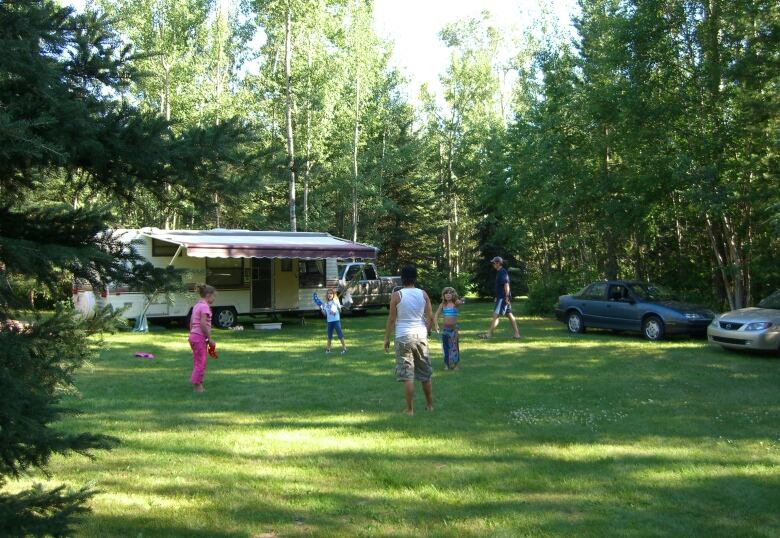Summer dreams dashed for RV owners caught in Pigeon Lake bylaw battle
Community rift has grown in battle over a little-known bylaw banning recreational vehicles

Dean Oliver was just 12 when his parents drove to Mulhurst Bayin 1978, pulling a travel trailer and a dream of family summers to come.
In the 40-odd years since buying thatpiece of land in the Pigeon Lake community, that trailer has been the backdrop to birthday parties, anniversaries and family reunions.
Over the years, they added three more recreational vehiclesone each for Oliver and his two sisters the family spent thousands of dollars to hook up electricity and install septic tanks,turning the property into a permanent summer haven.
But this summer, Oliver will be moving the RVs off the land following a years-long dispute overa County of Wetaskiwin bylaw that prohibits people from living in trailersin the community.
"I'm here to dismantle what was my parents' dream," Oliver said. "The county has beat us down over three years, throwing roadblocks and red tape in our way."
'There had to be a mistake'
Mulhurst Bay is an unincorporated lakefront community about85 kilometres southwest of Edmonton. Itregistereda population of 334 in the 2016 federalcensus, which also noted that about half of its dwellings are permanent residences.
Three years ago, complaints from a group of residents prompted the county to startenforcing a land-use bylaw that bans people from living in recreational vehicles. A landowner is allowed tokeep one RV on the property, but only for storage.
"Once these complaints were laid, we had to deal with these multiple RVs that were spotted on these lands," saidcounty reeve Terry van de Kraats.A compliance letter was sentto nine properties in the hamlet, ordering them to move the vehicles-turned-homes off the property.
"My mother called me and she was crying," Oliver said. "I thought that there had to be a mistake."

On paper, the local zoning bylaw has never allowed people to live in RVs.In fact, the developer specifically banned mobile homes and trailers.
But in practice, the neighbourhood of Cameron Highlands has been an amicable mix of RV owners and homeowners since the properties went up for sale in the 1970s, Oliver said. The county never told RV-dwelling landowners about the bylaw or the covenants.
"We never would've bought it if there was a restriction to putting our RV on there," said Jacqueline Webster, who has spent summers with her family in Cameron Highlands since 1994.
Gentrification in cottage country?
The issue has torn a rift through the community, according to Oliver.
While the county did not disclose the origin or the number of complaints, members of a group of homeowners dubbed the Concerned Citizens of Mulhurst Bay have, since 2015, repeatedly pushed council at meetings and in local newspaper editorials to enforce the bylaw.
"It's really intense and people are taking things personally," said Stu Salkeld, the editor of the Pipestone Flyer newspaper in Wetaskiwin, which has published competing editorials from residents on the issue.
"It's gotten past the point of land-use conflict with some people."

An RV offered families a lakeside summer retreat without the financial burden of a second home. Realtors even marketed the area as RV-friendly to attract prospective buyers before the county started to take notice in 2012.
"Call it gentrification, call it whatever you want, but people owning recreational properties out here and using them with RVs is a different level of income than people that can afford two homes," Oliver said.
"And that's what they want: people that can afford homes."
David Crombie, one of the members of the Concerned Citizens group, wrote in 2015that the group bears "no ill will toward any party.
"We are invested in this community's health," Crombie wrote in a 2015 editorial in the Pipestone Flyer. " Homebuyers were assured that neighbours in the subdivision would inhabit similar dwellings, maintaining the subdivison's character."
Crombie and Richard Conrad, two active members of the group, did not return a request for comment from CBC News.
Change the law
In a last-ditch effort to keep their RVs, Oliver decided to put together an application requesting the subdivision be rezoned.If the land-use bylaw didn't reflect the neighbourhood, Oliver figured the county should change it.
He proposed a zone that would permitlandowners to live in an RV, keep another one for storage, and have two visiting RVs on the land for up to 14 days. It wouldn't require a home tobe built.
Nearly three-quarters of the landowners in the subdivision backed Oliver's plan, according to a survey he presented to council. His street alone endorsed it by a margin of 90 per cent.
"It's been like a second job," Oliver said. "Trying to motivate people and educate people and get people involved, to get them to even believe that there was a chance, that there was something we could do to keep what we had."

Oliver needed the support to convince council to waive the requirement for an area structure plan, a document that outlines all ways the neighbourhood would be impacted by rezoning, from roads to sewage.
Council agreed to a moratorium on enforcing the land-use bylaw last June, as Oliver worked with administration to draft the plan.
But two weeks later, council reversed its decision. Amid pressure from other residents, itrescinded the moratorium.
In a presentation to council, resident Brian Link citedsewage concerns, since RVsdidn't have the same permitting requirements as a permanent home, and told councillors that it was "critical" to maintain property values since people had invested their retirement savings into their homes.
RVs,Link added, gave the impressionthat the neighbourhood was a recreational community.
"I am sorry that they do not have the abilities or resources to consider constructing modest dwellings that can cost less than a good-quality RV," he said.
Out of options?
The change of course took the wind out of Oliver's plan.
The rezoning application he'd worked on was turned down by council in September. Administration said it didn't address "key elements of waiving an area structure plan," including concerns around wastewater and transportation. Council went one step further, informing Oliver that heneeded 100 per cent support from the community before it would waivethe requirement for the plan.
"These people come from other municipalities. There's rules that they have to live by in those municipalities,"said Van de Kraats."And then they come out to the County of Wetaskiwin and expect us to bend the rules for them."
Oliver said it was the first time council told him he needed 100 per cent support for the plan. The council decision also meant that to continue pursuing the zoning change,he would have to commission an area structure plan, a document usually drafted by developers.
"That's tantamount to saying to us, it's never going to happen," Oliver said.
One of Oliver's neighbours sold their property amid the bylaw battle. Others, like him, are holding onto their properties, despite an uncertain future.
"I think eventually we'll probably end up selling it," said Webster, one of the locals. "Or maybe just keep it for our son, and just turn off the power and that. Go out and cut the grass once in a while."
Oliver, for his part, said his family has considered building on the land, but the tussle has taken its toll.
"It's not an attractive place for me to be," he said. "I haven't lost hope completely. I love this place and it's hard to stop feeling that way."












_(720p).jpg)


 OFFICIAL HD MUSIC VIDEO.jpg)
.jpg)



























































































